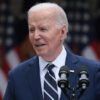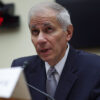A House subcommittee on Wednesday discussed the increasing left-wing bias at National Public Radio, a taxpayer-funded news and features network.
The hearing stemmed from a debate sparked by an online essay a month ago in The Free Press by longtime NPR editor Uri Berliner, who alleged that the network was both extremely biased and had abandoned its commitment to quality journalism.
Berliner, who considers himself a liberal, wrote in his essay that NPR had become deeply biased and that its news coverage had alienated all but a narrow, left-wing audience. He said the network needed to change or it would erode not only its own credibility, but the credibility of media in general.
Berliner resigned about a week after the controversy erupted.
NPR’s CEO, Katherine Maher, was asked to appear before the Oversight and Investigations Subcommittee of the House Committee on Energy and Commerce on Wednesday. However, the day before, she said she couldn’t make it because she didn’t have enough time to prepare. Maher also said that she had an NPR board meeting to attend.
“NPR respects the Committee and its request, and has offered to testify on a date in the near future that works for the Committee and Maher,” an NPR spokesperson said, according to Fox News.
A spokesperson for the committee responded to Maher’s absence.
“It speaks volumes that Ms. Maher has chosen not to appear [Wednesday] to answer for how her taxpayer-funded news outlet discriminates against the viewpoints of millions of Americans,” the committee spokesperson said, according to Fox News.
Rep. Morgan Griffith, R-Va., who was to chair the hearing, said in his opening statement that the committee was investigating whether allegations of ideological bias and censorship of conservative and moderate voices were true.
Griffith said that the subcommittee had invited Maher and that he hoped she would appear before the committee in the near future.
“The only reason not to appear in front of this committee at some point in the near future is if the allegations are both true and NPR doesn’t care,” the Virginia lawmaker said.
Democrats on the committee were dismissive of the hearing, and said that allegations of NPR’s bias are baseless.
Rep. Kathy Castor, D-Fla., said that NPR isn’t biased at all, that its reporting is valuable and objective, and that Republicans listen to too much conservative media.
“Despite the clear benefits of public radio, Republicans have brought us here to discuss an alleged bias at NPR,” she said. “Republicans say that NPR is biased against conservatives, but what they point to are examples of objective journalism. Disagreeing with reporting does not mean that the information is biased.”
The Florida Democrat suggested that the committee should instead focus on covering the gun deaths of children, preparing for the next pandemic, what she said were the successes of the Biden administration-backed Inflation Reduction Act, or climate change.
“Members may want to step out of the right-wing echo chambers, which have routinely peddled lies and conspiracy theories,” Castor said.
Rep. Cathy McMorris Rodgers, R-Wash., said that it was crucial to conduct oversight of NPR, which receives taxpayer dollars, and that there is no free-speech right to get taxpayers’ money to fund a media organization.
“It is a fundamental principle under the First Amendment for news agencies to report on stories however they see fit,” she said. “It is not, however, a fundamental principle for news organizations to receive public funding to express their viewpoint.”
McMorris Rodgers said that the hearing was to be about discussing accusations from within NPR that the news network is “actively censoring viewpoints” while taking taxpayer money.
“Note for the record that we invited NPR CEO Ms. Maher to participate in today’s hearing,” McMorris Rodgers said. “She declined to do so, stating that she needed more time to prepare and that she had a conflict with an NPR board meeting.”
The Washington congresswoman said that it was “especially troubling” that an organization funded with taxpayer money has “mocked, ridiculed, and attacked the people who fund their organization.”
McMorris Rodgers pointed to the Berliner essay and said that it was telling that NPR declined to report stories that could help President Donald Trump in the 2020 election, no matter “how true and important to the public conversation they were.”
She cited how Berliner wrote that an editor at NPR thought the news network shouldn’t report on the Hunter Biden laptop story in the lead-up to the 2020 presidential election because it could help Trump.
It was also revealing, she said, that Berliner said he found 87 editors registered as Democrats, but no Republicans.
“Today’s NPR has strayed from their core mission,” McMorris Rodgers said. “When an entity that was created by Congress and receives taxpayer funding strays from their core mission, there needs to be accountability and oversight.”
Rep. Frank Pallone, D-N.J., said that the hearing was a waste of time. He said that it was unfair for Republicans on the committee to call in the NPR CEO to testify, given that she only had a week to prepare and that she had a board meeting scheduled at the same time.
The New Jersey Democrat also said that, given that Maher had only been the CEO for six weeks, she shouldn’t have to answer for a “former, disgruntled employee,” referring to Berliner.
Pallone said that NPR plays a “vital role in democracy” in providing information. He said that public funding for the network goes to support mostly local programming that provides the last line of defense in “news deserts.”
He said that instead of investigating the publicly funded NPR, Congress should investigate “the vast landscape of right-wing media” that he said promotes “misinformation.”
Pallone said that investigating NPR hearkens back to the days of “McCarthyism.”
Howard Husock, a senior fellow at the American Enterprise Institute who had served on the board of the Corporation for Public Broadcasting, testified that he wanted to remind the committee of where public broadcasting began.
The Corporation for Public Broadcasting is the organization that oversees NPR.
It began with the Public Broadcasting Act of 1967, he said, and of particular relevance is the mandate from Congress that “public broadcasting from radio and television should, it says, be ‘responsive to the interests of people both in particular localities and throughout the United States.’”
Husock said that that’s where he has concerns about NPR. He pointed to a poll by the Pew Research Center that found “87% of NPR listeners describe themselves as Democrats, 12% as Republicans.”
He said that contrasts sharply with commercial television newscasts, “which are close to 50/50.”
The AEI fellow said that NPR doesn’t act like a “national taxpayer-supported service.”
NPR’s audience is not the product of limited reach, he said, “instead, it produces a product which seems not to attract a broad swath of America.”
That’s largely because of the selection of stories NPR reports. He suggested that changing the outdated Public Broadcasting Act would help alleviate the crisis of the decline of local newspapers.
Husock said that direct funding does not account for most of the taxpayer dollars NPR receives. Instead, “31% of revenues” come from fees charged to local affiliates. That means, he said, that federal money sent through grants to local NPR affiliates is recycled back to the national network.
Media Research Center Executive Editor Tim Graham said in his testimony that bias at NPR isn’t a recent phenomenon and that reporters at the network have intentionally tried, for instance, to derail Republican presidents’ Supreme Court nominees going back decades and that they continued that with the 2018 nomination of Supreme Court Justice Brett Kavanaugh.
“In March, between ‘Morning Edition’ and ‘Fresh Air,’ Kavanaugh accuser Christine Blasey Ford was granted an hour of taxpayer-funded airtime to reiterate her unproven charges of teenage sexual assault,” Graham said.
Yet, the network has failed to cover stories that might damage Democrats. He cited the case of Hunter Biden’s laptop, the salacious contents of which were dismissed by many “so-called mainstream media” outlets as “Russian disinformation.”
Graham said that many media outlets were biased when it came to covering that story, but “NPR stood out.” NPR’s public editor dismissed the story as a “politically driven event,” even though the network gave extensive coverage to Blasey Ford’s unproven allegations.
The MRC editor pointed to other examples of what he called bias at the network.
“NPR covered the [former House Speaker Nancy] Pelosi-picked House Jan. 6 Committee live for every minute, and then it couldn’t do a two-minute story on the Biden impeachment inquiry,” he said.
NPR has also “encouraged chaos and disorder in society,” Graham said:
In 2020, NPR’s blog ‘Code Switch,’ with the slogan ‘Race in Your Face,’ posted an interview promoting a new book titled ‘In Defense of Looting.’ On ‘The NPR Politics Podcast’ in 2021, they promoted a book by Yale law professor Elizabeth Hinton saying that protests against policy shouldn’t be called riots; they should be called ‘rebellions.’
On NPR’s ‘Fresh Air’ on April 15, 2023, the movie critic John Powers praised the movie ‘How to Blow Up a Pipeline,’ hailing it as ‘hugely timely.’ You know, this is what NPR is doing.
That’s what NPR is doing with taxpayer dollars, Graham said, “getting behind looting, rioting, and blowing up pipelines. And yet, NPR represents the Republicans as uniquely extreme.”






























